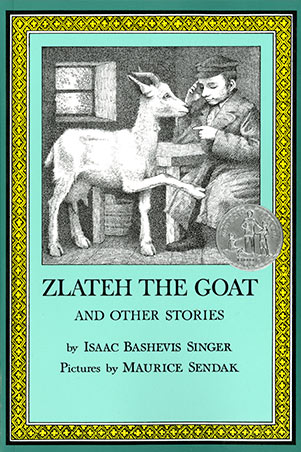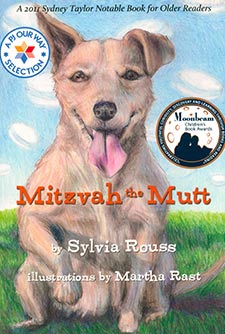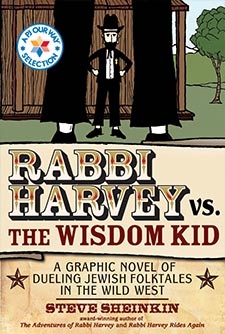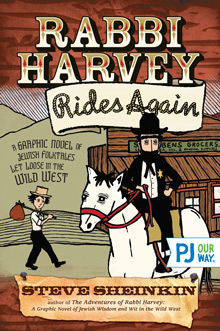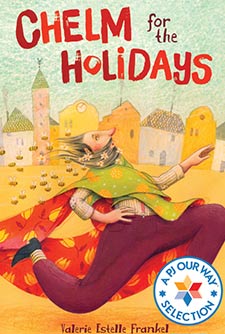Zlateh the Goat
Chelm is a village of fools, and the Elders of Chelm are the greatest fools of all. How do they manage? Read these seven silly stories and see for yourselves!
Average Rating
( hint: Login to leave a review! )
67 Reviews
Leave Review
What the Book is About
Jewish Content & Values
Positive Role Models
Content Advisory
Talk it Over!
More for You
What the Book is About
This is an entertaining collection of seven short stories, translated from the original Yiddish, written by the master storyteller, Isaac Bashevis Singer, and illustrated by Maurice Sendak. Woven through the fabric of each story are subtle lessons of courage, heroism, and good intentions gone awry. Two of the stories are classic folktales, featuring devils and the courageous heroes who fight them, and the other five stories center on the Amelia Bedelia-like foibles of the simple inhabitants of Chelm, a fictional village of fools.
Jewish Content & Values
- The Maggid: These stories invoke the time-honored spirit of the Maggid, the Jewish itinerant storyteller who traveled from village to village and told clever tales to entertain, inspire, and pass on from generation to generation.
- Yiddish culture: There are many Yiddish references in the stories, such as “Shlemiel” (an unlucky person), as well as Yiddish names like “Zlateh” and “Yenta.”
Positive Role Models
- In ‘Fool’s Paradise,’ Dr. Yoetz finds a clever and compassionate way to cure Atzel of his laziness that kids will appreciate.
- In the title story, ‘Zlateh the Goat,’ Aaron and Zlateh courageously find shelter in a haystack. The love and loyalty between the boy and his pet is inspiring.
Content Advisory
This book is appropriate for all ages, with one caveat: like in other classic folktales, there are a few encounters with devils and evil spirits that might frighten small children. If you plan to read the book aloud to young listeners, you might consider skipping ‘The Grandmother’s Tale’ and ‘The Devil’s Trick.’
Talk it Over!
Do you think that some of the characters in the Chelm stories could have been based on real people from long ago? In what ways have modern thinking and education changed the way that we think about the world?
More for You
Isaac Bashevis Singer was born in Poland in the early 1900s and immigrated to New York before World War Two. He wrote for the Jewish Daily Forward, a Yiddish language newspaper, and was a leading figure in the Yiddish literary movement, writing many popular short stories, books, and plays. He was awarded the Nobel Prize for Literature in 1978.
What the Book is About
What the Book is About
This is an entertaining collection of seven short stories, translated from the original Yiddish, written by the master storyteller, Isaac Bashevis Singer, and illustrated by Maurice Sendak. Woven through the fabric of each story are subtle lessons of courage, heroism, and good intentions gone awry. Two of the stories are classic folktales, featuring devils and the courageous heroes who fight them, and the other five stories center on the Amelia Bedelia-like foibles of the simple inhabitants of Chelm, a fictional village of fools.
Jewish Content & Values
Jewish Content & Values
- The Maggid: These stories invoke the time-honored spirit of the Maggid, the Jewish itinerant storyteller who traveled from village to village and told clever tales to entertain, inspire, and pass on from generation to generation.
- Yiddish culture: There are many Yiddish references in the stories, such as “Shlemiel” (an unlucky person), as well as Yiddish names like “Zlateh” and “Yenta.”
Positive Role Models
Positive Role Models
- In ‘Fool’s Paradise,’ Dr. Yoetz finds a clever and compassionate way to cure Atzel of his laziness that kids will appreciate.
- In the title story, ‘Zlateh the Goat,’ Aaron and Zlateh courageously find shelter in a haystack. The love and loyalty between the boy and his pet is inspiring.
Content Advisory
Content Advisory
This book is appropriate for all ages, with one caveat: like in other classic folktales, there are a few encounters with devils and evil spirits that might frighten small children. If you plan to read the book aloud to young listeners, you might consider skipping ‘The Grandmother’s Tale’ and ‘The Devil’s Trick.’
Talk it Over!
Talk it Over!
Do you think that some of the characters in the Chelm stories could have been based on real people from long ago? In what ways have modern thinking and education changed the way that we think about the world?
More for You
More for You
Isaac Bashevis Singer was born in Poland in the early 1900s and immigrated to New York before World War Two. He wrote for the Jewish Daily Forward, a Yiddish language newspaper, and was a leading figure in the Yiddish literary movement, writing many popular short stories, books, and plays. He was awarded the Nobel Prize for Literature in 1978.

